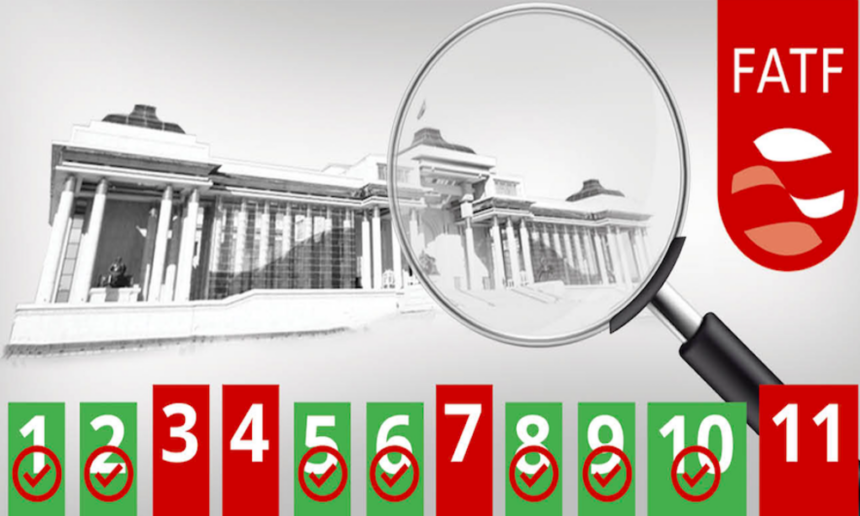Since 2017, Mongolia has been subject to “intensive monitoring” by the Financial Action Task Force (“FATF”), an inter-governmental organization that combats money laundering and terrorist financing.
Recently, at the FATF’s Asia/Pacific Group (APG) meeting held in Bangkok from September 9th to 10th, the government representatives of Mongolia introduced measures that had been implemented with respect to the FATF’s recommendation and were rated based on their progress. Apparently, the Mongolian government implemented 15 out of 20 FATF recommendations, but did not make sufficient progress on four out of eleven assessment criteria, and as a result was rated with a ‘C’. Representatives of the main bodies, the Bank of Mongolia, Financial Regulatory Commission, Ministry of Finance, Ministry of Justice and Internal Affairs, Intelligence Agency, and Police Agency went to Thailand and, like in the previous year, returned with a ‘C’ rating. Hence, the citizens have a right to know what the four criteria are, and why Mongolians were not able to tackle those problems.
Four unfulfilled criteria of progress evaluation
The FATF Recommendations suggest that the financial sector must function adequately, and that national security must be protected in order to prevent the financial system and economy from money laundering and terrorist financing. However, Mongolia failed to fulfill the following four out of eleven criteria in the evaluation of progress.
1. Article 3 which stipulates that “Financial institutions should be supervised, monitored, and regulated by designated monitoring bodies”, remains unfulfilled in Mongolia. The FATF revealed that a nominal and minimal monitoring, or inspection, of activities of nonbank financial institutions enables money laundering in Mongolia.
2. Article 4 that states “Reporting if the financial institution discovers suspicious transaction …” has not been implemented yet. The Mongolian government is incapable of controlling the mining, sales, and smuggling of gemstones and precious metals. It can be merely proved by the fact that tons of gold disappear as the tax increases. The gold mining by ninja miners is uncontrolled and in addition, this gold is sold at the site to secretive individuals with “special protections.” The smugglers who transport tons of gemstones across borders have negatively impacted the rating as well.
3. The Mongolian government was not able to enforce Article 7 which provides that “Cases and actions related to money laundering should be investigated, and sanctions should be effective, proportional to the severity of the offense, and be able to deteriorate recidivism.” The government pretends to be combating corruption by arresting the high-ranking government officials, the head of large banks, and corporations from time to time. The public has been witnessing: why any case or any arrested individual does not go entirely through the criminal procedures; why they do not get punished; and what the reason is for release. I am referring to renowned individuals such as the two former Prime Ministers, Minister of Finance, CEO of Erdenes Mongol, owner of Trade and Development Bank of Mongolia, who were arrested, released, and eventually, the cases got dropped.
4. Mongolia keeps infringing Article 11 which states “Individuals or legal entities which have been involved in spreading internationally prohibited weapons must be prevented from receiving, transferring, and using funds.” To illustrate, the Mongolian government is failing to enforce international economic sanctions against North Korea, a country that frightens the world with its experiments on nuclear weapons and that leaves its citizens hungry. Even though the number is gradually decreasing, there are approximately 300 North Korean citizens working in Mongolia and handing their salaries over to the Embassy of North Korea.
The inter-governmental organization has carried out a factual evaluation that exposes the true colors of the Mongolian government. When will the “grey” government in the grey palace stop their actions that might place their country on the “grey list” and make citizens live in the twilight?
If Mongolia is included on the FATF grey list, the exchange rate of the Mongolian Tugrik will fall. Consequently, once again the citizens and ordinary business owners will suffer from the harm.
The Mongolian representatives who got regional ‘C’ ratings are going to receive the final decision regarding inclusion on the FATF grey list at the annual FATF meeting in Paris on October 12th 2019.
2019.10.02
Trans. by Riya.T and Ariunzaya.M












